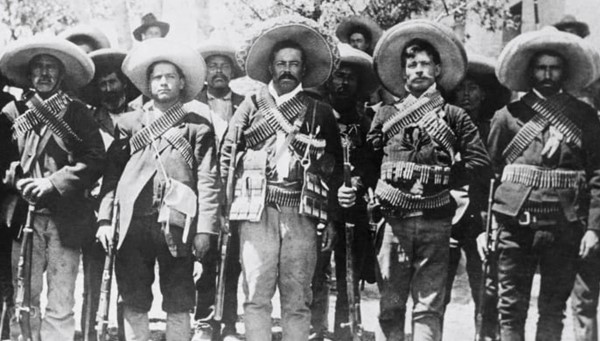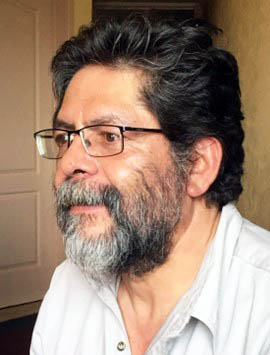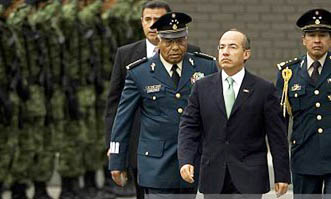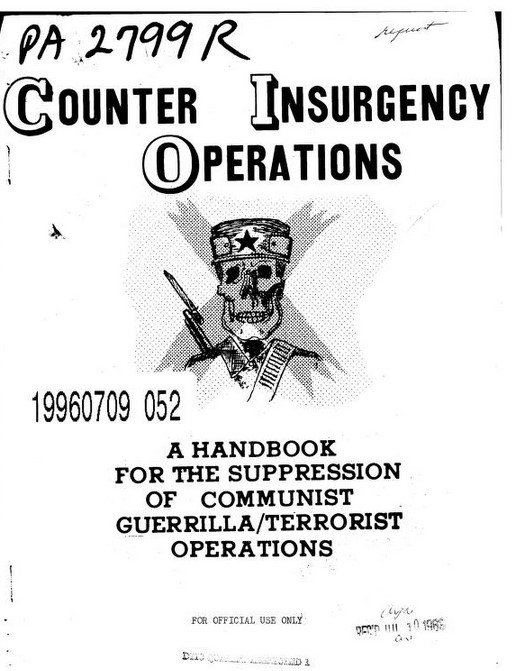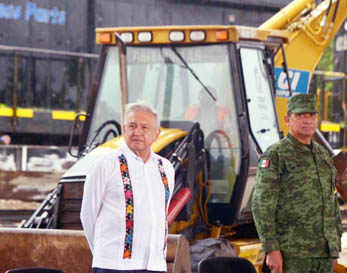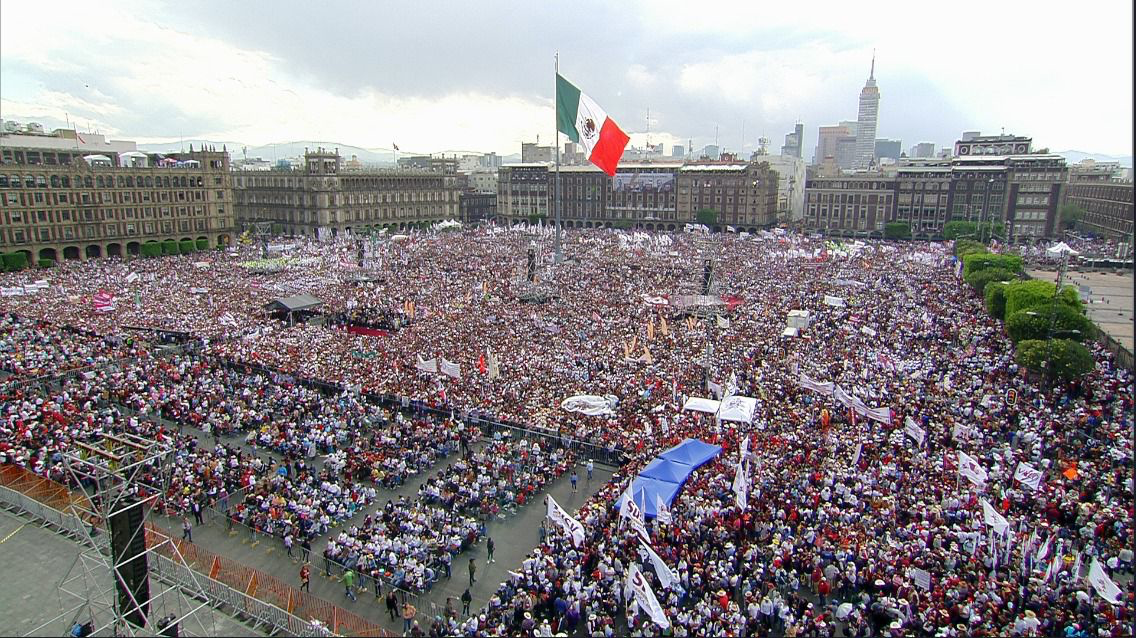|
|
|
|
The weekly newsletter of the México Solidarity Project |
|
|
|
Online at mexicosolidarityproject.org |
|
March 22, 2023/ This week's issue/ Meizhu Lui, for the editorial team |
|
|
Pancho Villa and his troops/Getty Images, History.com |
|
AMLO and México’s Military: Cause for Concern? |
|
AMLO’s relationship to México’s military — his expansion of that military’s role — has been setting off alarm bells of late. Do we all have cause for alarm? Let’s start with a basic question: Why does México need a military in the first place?
The first reason: Any nation needs a military to defend against external threats. As analyst Gabriel Ramirez points out in our Voices interview this week, México just happens to sit next door to a gun-crazy neighbor with a nasty habit of shooting over the fence. The United States has invaded Latin American nations more than 70 times — and México alone 14 times! And just last week, after a drug cartel mistakenly abducted and killed US travelers, Republican lawmakers in Congress called for a US military march into México!
A second military function: to work on projects no other organization or agency may be equipped to pull off. Back in the México of the 1920s, as Jayson Porter noted in last week’s Bulletin, only the Mexican military had the organizational capacity to fight off an invasion — of locusts!
These projects all have a jobs aspect. As the legendary insurgent commander Pancho Villa noted over a century ago during the Mexican Revolution: “The only thing to do with soldiers in time of peace is to put them to work. An idle soldier is always thinking of war.” Here in the 2020s, AMLO has put the military in charge of five mega-construction projects, the Mayan Train among them, an effort that will produce a huge number of public sector jobs.
But things can start to get ugly when we turn to still another rationale for modern militaries: to defend against internal threats. In México, military and security forces have over recent years regularly colluded with the cartels to murder and disappear those who get in their way. Can the new security force created by AMLO, the National Guard, change history and protect the people of México and not the nation’s corrupt elite?
Any expansion of the size and scope of security forces raises fundamental questions about power. Can an expanded military, for instance, become stronger than the government it’s supposed to serve? Our interview with Gabriel Ramirez reminds us that we can’t afford to view what’s currently going on with México’s military in either simple black-and-white or through rose-colored glasses. We need 3-D to get a truer picture. Even then, we’d be missing the fourth dimension: time. The end of this story has yet to be written. |
|
|
|
Don’t miss an issue. Subscribe to the weekly México Solidarity Bulletin! |
|
|
|
|
Does a Large Army Mean a 'Militarized’ Nation? |
|
The independent online Mexican journal Regeneración makes an appropriate home for Gabriel Ramirez. A long-time progressive activist and organizer, Ramirez regularly offers readers an astute analysis of Mexican politics grounded in the nation’s history and committed to advancing México’s continuing effort to become a democratic nation of, by, and for working people. We spoke with Ramirez to get his take on the relationship between Mexican President López Obrador and México’s military.
The US press has been blasting AMLO for “militarizing” his country. Has the army been expanding? |
|
|
Just as the army in the United States has been expanding! Just look at the US militarization of the border. But México historically has had another reason for expanding the army: We sit on the border of an imperialist country that has never had a problem using armed force to compel México to comply with its orders.
AMLO inherited a war between drug gangs in collusion with the institutional and non-institutional US and Mexican neoliberal framework. With neoliberalism, we went from a failed state to a narco-state. And México has to face the consequences of the US-led drug war on real people: hundreds of thousands of Latin Americans dead, disappeared, and displaced. Stopping the effects of the war imposed by the empire remains a conflictive and bloody process with no easy solutions.
The US press critique — that México has undergone a “militarization” — reflects mainly the media’s intimate relationships with US neoliberals who wholeheartedly support their “Mexican” neoliberal accomplices who’ve been removed from power by a popular electoral insurrection. |
|
The army has been the enforcer of that “narco-state.” Why can’t AMLO appoint new, honest generals?
The problem in México isn’t the generals or the army. Elements of the army and high-ranking figures have been involved in episodes of repression, corruption, and drug crime. But the army doesn’t hold an independent position on the political scene. |
|
|
Felipe Calderon, as president, with his defense minister and Navy secretary |
|
In México today, AMLO — unlike the neoliberals and unlike the PRI of the old days — has stopped the systematic use of force to repress or persecute.
The current situation certainly has many contradictions. Remember that AMLO won the presidency not just with social movement backing, but through a broad alliance of various sectors. At the same time, he has positioned his administration as a left government.
The electoral coalition that is Morena allows anyone to register as a member and run for office, a political tradition that started with the PRI, and that’s why today Morena lawmakers in the legislature include people from the left and social movements as well as people from the right, the garbage of the Earth! Morena has become infested with chapulines, people who have jumped into Morena from one of the conservative parties.
Can you say more about the connections between the Mexican military and the drug cartels and the generals’ connection to the arms industry?
The trial of García Luna, former Mexican President Felipe Calderon’s head of México’s equivalent to the FBI, shows the links that existed at the highest levels between the Calderón government with the drug traffickers. But what about the North American connections? We don’t yet know their full extent.
Drug trafficking has steadily increased over the last 36 years. The state of Sinaloa has been México’s traditional center for drugs, particularly heroin. Before Calderón, the narcos and the government had a pact. They shared drug money, a relative peace reigned. But the neoliberals wanted in on the action when they came into office. They broke the pact. This led to more violence. |
|
In addition, we had special forces in México who had received training at the School of the Americas, the training academy that the US Department of Defense runs, and its subsidiaries. The School for the Americas has produced some of Latin America’s worst human rights violators.
Mexican military personnel, for example, learned through this training the terror tactics of the kaibles in Guatemala, a special operations unit specializing in counterinsurgency, and later transferred those tactics to the Mexican drug war.
The drug trade and the corruption associated with it — and not the size of the military — make up the heart of the problem México faces. |
|
|
Photo: School of the Americas Archives |
|
How otherwise to explain how the US and Mexican governments don’t seem to know how to simply follow the money? How can the US be able to produce a nuclear weapon but not know how to look into a safe deposit box in Barbados! The US and Mexican governments should be addressing the narco problem by going straight to its source. They’re not.
When AMLO first took office, he criticized the military culture and formed a new police force called the National Guard, headed by civilians. But the National Guard now operates under military control. Why?
Remember that we remain in a war situation. We have, for example, an emergency in our morgues, with around 50,000 unidentified bodies. In addition, we’re seeing the demands for justice against those responsible for acts of political repression tied to the drug war. AMLO’s government, over its four years in office, has made progress, but much remains to be clarified. |
|
The AMLO government felt that creating a new National Guard would be a solution to the infiltration of the police at all levels by narco-neoliberalism. But we in the left believe this National Guard needs civilian leadership that can deliver clear public accounting and submit to civil law. Under a military structure, you must obey a command. A civilian structure would be independent from the military.
The military’s role has expanded into civilian projects, such as building an airport and overseeing the construction of the Tren Maya. Human Rights organizations have expressed alarm. |
|
|
President López Obrador at the 2020 ribbon-cutting for the Mayan Train/Presidencia, Gobierno de México |
|
Having the army in charge of civilian projects happens regularly in other countries. Using the military does not automatically bring human rights abuses. Take the subway system in México City. The military presence there protects riders, and no one has been killed by the security forces in the Metro.
You have to understand that today we have a well-intentioned government under AMLO. His greatest achievement has been changing México’s federal budget. He’s vastly increased spending for social programs and expanded the human right to a decent life.
AMLO has been working to fund these social programs through money recouped from corrupt officials. But the corrupt system remains. Eliminating it within a few short years would be impossible.
We have begun to transform ourselves, but the road ahead remains long, especially if the US-imposed drug war and the corruption around it continue, corruption that includes the arms industry as well as financial institutions and politicians.
You don’t see news about this within the empire! |
|
|
|
A massive rally in Mexico City’s main plaza Saturday commemorated Mexico's |
|
Mexicans Turn Out To Support Energy Sovereignty |
|
On Saturday, March 18, tens of thousands of Mexicans filled the Zocalo in México City to support President Andrés Manuel López Obrador’s nationalization of the country’s lithium and his promise to do everything he can to make México energy self-sufficient by 2024. The rally came on the 85th anniversary of the nationalization of México’s oil industry by President Cardenas in 1938. Journalist Zoe Alexandra covered the massive gathering for the People’s Dispatch. We excerpt from her coverage below.
The Cardenas Oil Expropriation Decree ordered the expropriation of the oil fields, refineries, distribution stations, oil pipelines, and other physical assets of the 17 foreign companies and their subsidiaries that controlled the industry in México. This move meant that México’s oil resources and industry from then on would benefit the people and strengthen the national economy. The major motivation for the Cardenas decision: the labor conflict between Mexican workers and foreign oil companies over salaries and working conditions. With the expropriation and founding of México’s state oil company Pemex three months later, workers in the sector empowered by the president’s intervention on their behalf saw their conditions significantly improve. AMLO has now nationalized the México’s lithium, a move approved last April by the Mexican Congress. High-tech firms use lithium — the new gold! — to manufacture rechargeable electric batteries in a variety of electronics ranging from electric cars to computers and cellphones. In his address announcing the lithium nationalization, AMLO recounted the bold Cardenas move to confront the foreign oil companies head on.
“What we are doing now is nationalizing lithium so that it cannot be exploited by foreigners, not from Russia, China, or the United States,” he declared. “Oil and lithium are of the nation, of the Mexican people, of all Mexicans.” |
|
|
Recent news reports and commentaries, from progressive and mainstream media,
México president holds massive rally ahead of 2024 elections, Associated Press. One of López Obrador’s main policy initiatives has been to save the state-owned oil company that former President Lázaro Cárdenas founded in 1938.
Sin Photoshop: así abarrotaron el Zócalo los miles de seguidores de AMLO este 18 de marzo, Indigo. Pese a la lluvia, Miles de personas ya se encuentran en el Zócalo capitalino para celebrar el aniversario de la Expropiación Petrolera, evento convocado por el presidente Andrés Manuel López Obrador.
México’s Fourth Transformation and Why the US Wants to Stop It, YouTube. A WTF is Going on in Latin America & the Caribbean interview with journalist Kurt Hackbarth.
Mike Pompeo, exsecretario de Estado de Trump, sugiere ahora usar drones contra narcos, Sin Embargo. El exfuncionario de Donald Trump escribió un artículo donde señala que, si México no quiere o puede eliminar al crimen organizado, entonces que se dé paso a EU para “proteger al pueblo estadounidense”.
Ebrard launches campaign to defend Mexico’s reputation in US, México News Daily. México’s foreign affairs minister has begun a campaign against the “unacceptable attacks” on his country by Republican Party lawmakers and ex-officials.
Jessica Xantomila, Causó el neoliberalismo fuga de 1.4 millones de cerebros, La Jornada. Aproximadamente 1,4 millones de profesionales1.4 millones de profesionistas mexicanos se encuentran en el extranjero, y poco más de 300 mil posgraduados radican en al menos 56 países.
Ulises Rodríguez López, AMLO no se deja mangonear por Elon Musk: no dará subsidio a Tesla, Polemón. El Presidente Andrés Manuel López Obrador ha revelado que rechazó entregar un subsidio del 50% a Tesla para la instalación de una fábrica de baterías en el estado de Hidalgo.
LZ Granderson, ‘Blame México’ won't solve the crises of guns and fentanyl, Los Angeles Times. Over 200,000 guns get trafficked into México from the US each year. The US gun industry has been arming Mexican drug cartels for as long as Mexican drug cartels have been going.
“Liquidaciones” de Lorenzo Córdova y consejeros del INE son ilegales: Pablo Gómez, Proceso. El titular de la UIF consideró que las compensaciones que obtendrán Lorenzo Córdova, Ciro Murayama y otros dos consejeros no están asignadas por ley, decreto o contrato. |
|
|
The Mexico Solidarity Project brings together activists from various socialist and left organizations and individuals committed to worker and global justice who see the 2018 election of Andrés Manuel López Obrador as president of México as a watershed moment. AMLO and his progressive Morena party aim to end generations of corruption, impoverishment, and subservience to US interests. Our Project supports not just Morena, but all Mexicans struggling for basic rights, and opposes US efforts to undermine organizing and México’s national sovereignty.
Editorial committee: Meizhu Lui, Bruce Hobson, Bill Gallegos, Sam Pizzigati, Courtney Childs, Victoria Hamlin, Agatha Hinman, Steven Hollis, Daniel McCool, Betty Forrester. To give feedback or get involved yourself, please email us! |
|
|
|
Subscribe! Get the México Solidarity Bulletin in your email box every week. |
|
|
|
Web page and application support for the México Solidarity Project from NOVA Web Development, a democratically run, worker-owned and operated cooperative focused on developing free software tools for progressive organizations. |

